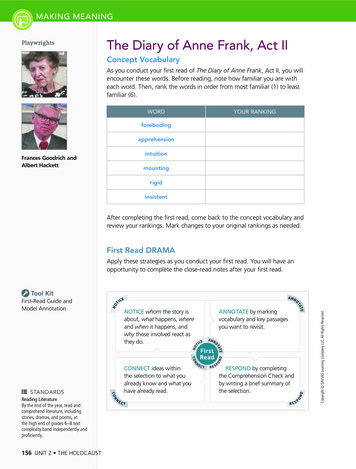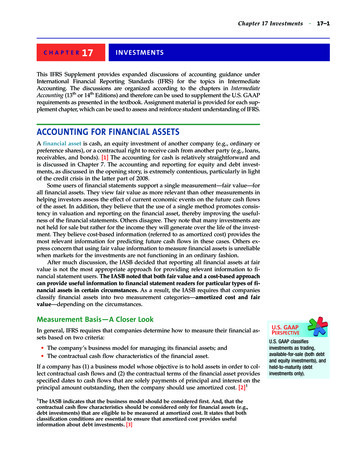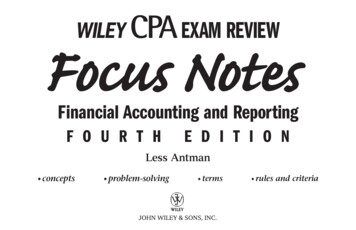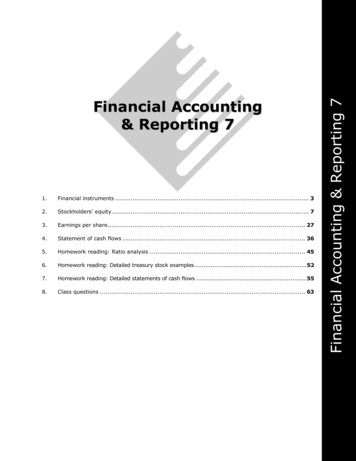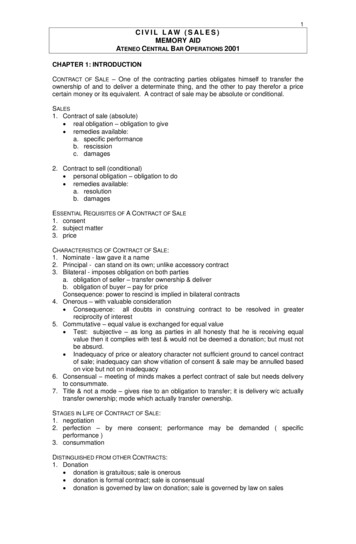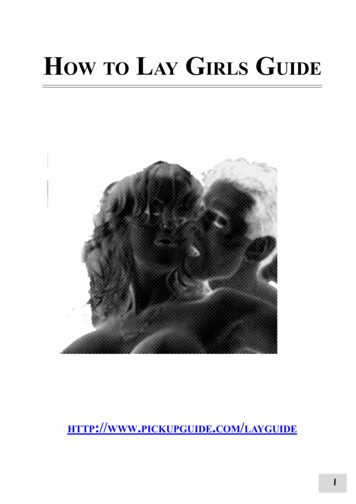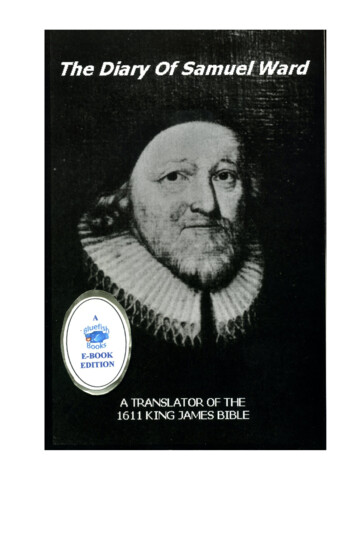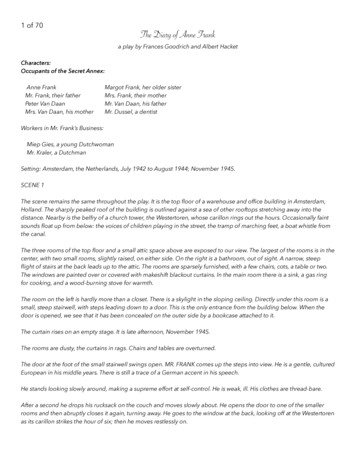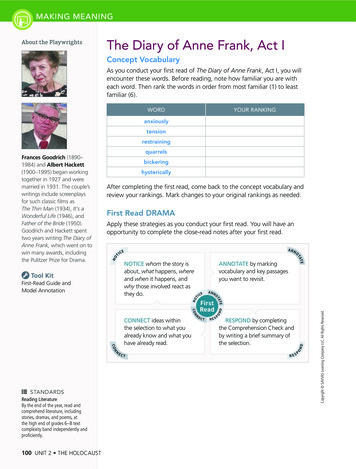
Transcription
MAKING MEANINGAbout the PlaywrightsThe Diary of Anne Frank, Act IConcept VocabularyAs you conduct your first read of The Diary of Anne Frank, Act I, you willencounter these words. Before reading, note how familiar you are witheach word. Then rank the words in order from most familiar (1) to leastfamiliar (6).WORDYOUR RANKINGanxiouslytensionrestrainingTool KitFirst-Read Guide andModel Annotation STANDARDSReading LiteratureBy the end of the year, read andcomprehend literature, includingstories, dramas, and poems, atthe high end of grades 6–8 textcomplexity band independently andproficiently.100 UNIT 2 The HolocaustquarrelsbickeringhystericallyAfter completing the first read, come back to the concept vocabulary andreview your rankings. Mark changes to your original rankings as needed.First Read DRAMAApply these strategies as you conduct your first read. You will have anopportunity to complete the close-read notes after your first read.NOTICE whom the story isabout, what happens, whereand when it happens, andwhy those involved react asthey do.ANNOTATE by markingvocabulary and key passagesyou want to revisit.CONNECT ideas withinthe selection to what youalready know and what youhave already read.RESPOND by completingthe Comprehension Check andby writing a brief summary ofthe selection.Copyright SAVVAS Learning Company LLC. All Rights Reserved.Frances Goodrich (1890–1984) and Albert Hackett(1900–1995) began workingtogether in 1927 and weremarried in 1931. The couple’swritings include screenplaysfor such classic films asThe Thin Man (1934), It’s aWonderful Life (1946), andFather of the Bride (1950).Goodrich and Hackett spenttwo years writing The Diary ofAnne Frank, which went on towin many awards, includingthe Pulitzer Prize for Drama.
ANCHOR TEXT DRAMAThe Diary ofAnne Frank, Act ICopyright SAVVAS Learning Company LLC. All Rights Reserved.Frances Goodrich and Albert HackettBACKGROUNDAnne Frank was a young Jewish girl living in Amsterdam duringthe Nazi occupation of the Netherlands in World War II. Fearing fortheir lives, the Frank family was forced into hiding. The diary thatAnne kept during their time in hiding is one of the most famousand heartbreaking pieces of literature from the Holocaust. Anne’sdiary gained recognition both for its historical significance and forher incredible talent as a writer and storyteller. Tragically, Anne diedin a concentration camp just weeks before it was liberated by Britishsoldiers. The play you will read was based on her life and diary.SCAN FORMULTIMEDIANOTESCharactersAnne FrankOtto FrankEdith FrankMargot FrankMiep GiesMr. KralerMr. DusselPeter Van DaanMrs. Van DaanMr. Van DaanThe Diary of Anne Frank, Act I 101
Act INOTESScene 11. carillon (KAR uh lon) n. set ofbells, each producing one noteof the scale.22. blackout curtains dark curtainsthat conceal all lights thatmight be visible to bombersfrom the air.CLOSE READANNOTATE: Mark details inparagraphs 1–5 that describethe dimensions, or sizes, of thevarious rooms.34QUESTION: Why do theplaywrights note these details ofthe setting?5CONCLUDE: What is the effectof these details?6783. barrel organ mechanicalmusical instrument oftenplayed by street musicians inpast decades.102 UNIT 2 The Holocaust9[The scene remains the same throughout the play. It is the top floorof a warehouse and office building in Amsterdam, Holland. Thesharply peaked roof of the building is outlined against a sea of otherrooftops, stretching away into the distance. Nearby is the belfry of achurch tower, the Westertoren, whose carillon1 rings out the hours.Occasionally faint sounds float up from below: the voices ofchildren playing in the street, the tramp of marching feet, a boatwhistle from the canal.The three rooms of the top floor and a small attic space above areexposed to our view. The largest of the rooms is in the center, withtwo small rooms, slightly raised, on either side. On the right is abathroom, out of sight. A narrow steep flight of stairs at the backleads up to the attic. The rooms are sparsely furnished with a fewchairs, cots, a table or two. The windows are painted over, orcovered with makeshift blackout curtains.2 In the main room there isa sink, a gas ring for cooking and a woodburning stove for warmth.The room on the left is hardly more than a closet. There is a skylightin the sloping ceiling. Directly under this room is a small steepstairwell, with steps leading down to a door. This is the only entrancefrom the building below. When the door is opened we see that it hasbeen concealed on the outer side by a bookcase attached to it.The curtain rises on an empty stage. It is late afternoon,November 1945.The rooms are dusty, the curtains in rags. Chairs and tables areoverturned.The door at the foot of the small stairwell swings open. Mr. Frankcomes up the steps into view. He is a gentle, cultured European in hismiddle years. There is still a trace of a German accent in his speech.He stands looking slowly around, making a supreme effort atself-control. He is weak, ill. His clothes are threadbare.After a second he drops his rucksack on the couch and moves slowlyabout. He opens the door to one of the smaller rooms, and thenabruptly closes it again, turning away. He goes to the window atthe back, looking off at the Westertoren as its carillon strikes thehour of six, then he moves restlessly on.From the street below we hear the sound of a barrel organ3 andchildren’s voices at play. There is a many-colored scarf hangingfrom a nail. Mr. Frank takes it, putting it around his neck. As hestarts back for his rucksack, his eye is caught by something lying onthe floor. It is a woman’s white glove. He holds it in his hand andsuddenly all of his self-control is gone. He breaks down, crying.Copyright SAVVAS Learning Company LLC. All Rights Reserved.1
1011Miep. Are you all right, Mr. Frank?12Mr. Frank. [Quickly controlling himself] Yes, Miep, yes.1314Mr. Frank. I’ve come to say good-bye . . . I’m leaving here,Miep.Miep. What do you mean? Where are you going? Where?16Mr. Frank. I don’t know yet. I haven’t decided.18192021Miep. Mr. Frank, you can’t leave here! This is your home!Amsterdam is your home. Your business is here, waiting foryou . . . You’re needed here . . . Now that the war is over,there are things that . . .Mr. Frank. I can’t stay in Amsterdam, Miep. It has too manymemories for me. Everywhere there’s something . . . thehouse we lived in . . . the school . . . that street organ playingout there . . . I’m not the person you used to know, Miep. I’ma bitter old man. [Breaking off] Forgive me. I shouldn’t speakto you like this . . . after all that you did for us . . . thesuffering . . .Miep. No. No. It wasn’t suffering. You can’t say we suffered.[As she speaks, she straightens a chair which is overturned.]Mr. Frank. I know what you went through, you and Mr.Kraler. I’ll remember it as long as I live. [He gives one last lookaround.] Come, Miep. [He starts for the steps, then remembers hisrucksack, going back to get it.]Miep. [Hurrying up to a cupboard] Mr. Frank, did you see?There are some of your papers here. [She brings a bundle ofpapers to him.] We found them in a heap of rubbish on thefloor after . . . after you left.22Mr. Frank. Burn them. [He opens his rucksack to put the glove in it.]23Miep. But, Mr. Frank, there are letters, notes . . .24Mr. Frank. Burn them. All of them.25Miep. Burn this? [She hands him a paperbound notebook.]26NOTESMiep. Everyone in the office has gone home . . . It’s after six.[Then pleading] Don’t stay up here, Mr. Frank. What’s the useof torturing yourself like this?1517Copyright SAVVAS Learning Company LLC. All Rights Reserved.We hear footsteps on the stairs. Miep Gies comes up, looking forMr. Frank. Miep is a Dutch girl of about twenty-two. She wears acoat and hat, ready to go home. She is pregnant. Her attitudetoward Mr. Frank is protective, compassionate.]Mr. Frank. [Quietly] Anne’s diary. [He opens the diary andbegins to read.] “Monday, the sixth of July, nineteen fortytwo.” [To Miep] Nineteen forty-two. Is it possible, Miep? . . .Only three years ago. [As he continues his reading, he sits downThe Diary of Anne Frank, Act I 103
on the couch.] “Dear Diary, since you and I are going to begreat friends, I will start by telling you about myself. Myname is Anne Frank. I am thirteen years old. I was born inGermany the twelfth of June, nineteen twenty-nine. As myfamily is Jewish, we emigrated to Holland when Hitler cameto power.”27284. capitulation (kuh pihch uh LAYshuhn) n. surrender.29305. yellow stars Stars of David,the six-pointed stars that aresymbols of Judaism. The Nazisordered all Jews to wear themon their clothing.31[As Mr. Frank reads on, another voice joins his, as if coming fromthe air. It is Anne’s Voice.]Mr. Frank and Anne. “My father started a business,importing spice and herbs. Things went well for us untilnineteen forty. Then the war came, and the Dutchcapitulation,4 followed by the arrival of the Germans. Thenthings got very bad for the Jews.”[Mr. Frank’s Voice dies out. Anne’s Voice continues alone. Thelights dim slowly to darkness. The curtain falls on the scene.]Anne’s Voice. You could not do this and you could not dothat. They forced Father out of his business. We had to wearyellow stars.5 I had to turn in my bike. I couldn’t go to aDutch school any more. I couldn’t go to the movies, or ride inan automobile, or even on a streetcar, and a million otherthings. But somehow we children still managed to have fun.Yesterday Father told me we were going into hiding. Where,he wouldn’t say. At five o’clock this morning Mother wokeme and told me to hurry and get dressed. I was to put on asmany clothes as I could. It would look too suspicious if wewalked along carrying suitcases. It wasn’t until we were onour way that I learned where we were going. Our hidingplace was to be upstairs in the building where Father used tohave his business. Three other people were coming in withus . . . the Van Daans and their son Peter . . . Father knew theVan Daans but we had never met them . . .[During the last lines the curtain rises on the scene. The lights dimon. Anne’s Voice fades out.] Scene 216. portly (PAWRT lee) adj. largeand heavy.104 UNIT 2 The Holocaust2[It is early morning, July 1942. The rooms are bare, as before, butthey are now clean and orderly.Mr. Van Daan, a tall portly6 man in his late forties, is in the mainroom, pacing up and down, nervously smoking a cigarette. Hisclothes and overcoat are expensive and well cut.Copyright SAVVAS Learning Company LLC. All Rights Reserved.NOTES
345678910Mrs. Van Daan sits on the couch, clutching her possessions, ahatbox, bags, etc. She is a pretty woman in her early forties. Shewears a fur coat over her other clothes.Peter Van Daan is standing at the window of the room on theright, looking down at the street below. He is a shy, awkward boy ofsixteen. He wears a cap, a raincoat, and long Dutch trousers, like“plus fours.”7 At his feet is a black case, a carrier for his cat.The yellow Star of David is conspicuous on all of their clothes.]Mrs. Van Daan. [Rising, nervous, excited] Something’shappened to them! I know it!Mr. Van Daan. Now, Kerli!Mrs. Van Daan. Mr. Frank said they’d be here at seveno’clock. He said . . .7. plus fours n. short pants wornfor active sports.CLOSE READANNOTATE: In paragraphs6–10, mark punctuation thatsuggests the characters areanxious or being interrupted.QUESTION: Why might theMr. Van Daan. They have two miles to walk. You can’texpect . . .playwrights have used thesepunctuation marks?Mrs. Van Daan. They’ve been picked up. That’s what’shappened. They’ve been taken . . .CONCLUDE: What mood, orfeeling, does this punctuationhelp convey?11[Mr. Van Daan indicates that he hears someone coming.]12Mr. Van Daan. You see?[Peter takes up his carrier and his schoolbag, etc., and goes into themain room as Mr. Frank comes up the stairwell from below.Mr. Frank looks much younger now. His movements are brisk, hismanner confident. He wears an overcoat and carries his hat and asmall cardboard box. He crosses to the Van Daans, shaking handswith each of them.]Copyright SAVVAS Learning Company LLC. All Rights Reserved.13NOTESAnne in happier times, out for a stroll with her family and friends.The Diary of Anne Frank, Act I 105
8. Green Police Dutch Gestapo,or Nazi police, who woregreen uniforms and wereknown for their brutality.Those in danger of beingarrested or deported fearedthe Gestapo, especiallybecause of their practice ofraiding houses to round upvictims in the middle of thenight—when people are mostconfused and vulnerable.151617189. mercurial (muhr KYUR ee uhl)adj. quick or changeable inbehavior.192021222324252610. ration (RASH uhn) booksbooks of stamps given toensure the equal distributionof scarce items, such asmeat or gasoline, in times ofshortage.27282930106 UNIT 2 The HolocaustMr. Frank. Mrs. Van Daan, Mr. Van Daan, Peter. [Then, inexplanation of their lateness] There were too many of the GreenPolice8 on the streets . . . we had to take the long way around.[Up the steps come Margot Frank, Mrs. Frank, Miep (notpregnant now) and Mr. Kraler. All of them carry bags, packages,and so forth. The Star of David is conspicuous on all of the Franks’clothing. Margot is eighteen, beautiful, quiet, shy. Mrs. Frank is ayoung mother, gently bred, reserved. She, like Mr. Frank, has aslight German accent. Mr. Kraler is a Dutchman, dependable,kindly.As Mr. Kraler and Miep go upstage to put down their parcels,Mrs. Frank turns back to call Anne.]Mrs. Frank. Anne?[Anne comes running up the stairs. She is thirteen, quick in hermovements, interested in everything, mercurial9 in her emotions.She wears a cape, long wool socks and carries a schoolbag.]Mr. Frank. [Introducing them] My wife, Edith. Mr. andMrs. Van Daan [Mrs. Frank hurries over, shaking hands withthem.] . . . their son, Peter . . . my daughters, Margot andAnne.[Anne gives a polite little curtsy as she shakes Mr. Van Daan’shand. Then she immediately starts off on a tour of investigationof her new home, going upstairs to the attic room.Miep and Mr. Kraler are putting the various things they havebrought on the shelves.]Mr. Kraler. I’m sorry there is still so much confusion.Mr. Frank. Please. Don’t think of it. After all, we’ll haveplenty of leisure to arrange everything ourselves.Miep. [To Mrs. Frank] We put the stores of food you sent inhere. Your drugs are here . . . soap, linen here.Mrs. Frank. Thank you, Miep.Miep. I made up the beds . . . the way Mr. Frank andMr. Kraler said. [She starts out.] Forgive me. I have to hurry.I’ve got to go to the other side of town to get some rationbooks10 for you.Mrs. Van Daan. Ration books? If they see our names onration books, they’ll know we’re here.Mr. Kraler. There isn’t anything . . .Miep. Don’t worry. Your names won’t be on them. [As shehurries out] I’ll be up later.Mr. Frank. Thank you, Miep.Copyright SAVVAS Learning Company LLC. All Rights Reserved.14NOTES
3132333435363738Copyright SAVVAS Learning Company LLC. All Rights Reserved.39Mrs. Frank. [To Mr. Kraler] It’s illegal, then, the ration books?We’ve never done anything illegal.Mr. Frank. We won’t be living here exactly according toregulations.[As Mr. Kraler reassures Mrs. Frank, he takes various smallthings, such as matches, soap, etc., from his pockets, handing themto her.]Mr. Kraler. This isn’t the black market,11 Mrs. Frank. This iswhat we call the white market . . . helping all of the hundredsand hundreds who are hiding out in Amsterdam.Anne. It’s the Westertoren!Mr. Kraler. I must go. I must be out of here and downstairs inthe office before the workmen get here. [He starts for the stairsleading out.] Miep or I, or both of us, will be up each day tobring you food and news and find out what your needs are.Tomorrow I’ll get you a better bolt for the door at the foot ofthe stairs. It needs a bolt that you can throw yourself andopen only at our signal. [To Mr. Frank] Oh . . . You’ll tell themabout the noise?Mr. Frank. I’ll tell them.Mr. Kraler. Good-bye then for the moment. I’ll come upagain, after the workmen leave.Mr. Frank. Good-bye, Mr. Kraler.41Mrs. Frank. [Shaking his hand] How can we thank you?42[The others murmur their good-byes.]44Mr. Kraler. I never thought I’d live to see the day when aman like Mr. Frank would have to go into hiding. When youthink—[He breaks off, going out. Mr. Frank follows him down the steps,bolting the door after him. In the interval before he returns, Petergoes over to Margot, shaking hands with her. As Mr. Frank comesback up the steps, Mrs. Frank questions him anxiously.]45Mrs. Frank. What did he mean, about the noise?46Mr. Frank. First let us take off some of these clothes.4711. black market illegal way ofbuying scarce items.[The carillon is heard playing the quarter-hour before eight.Mr. Kraler looks at his watch. Anne stops at the window as shecomes down the stairs.]4043NOTESanxiously (ANGK shuhslee) adv. in a nervous orworried way[They all start to take off garment after garment. On each of theircoats, sweaters, blouses, suits, dresses, is another yellow Star ofDavid. Mr. and Mrs. Frank are underdressed quite simply.The Diary of Anne Frank, Act I 107
The others wear several things: sweaters, extra dresses, bathrobes,aprons, nightgowns, etc.]48CLOSE READANNOTATE: In paragraph 54,mark the sound that causes thecharacters to feel afraid.49Anne. [As she is removing a pair of panties] A cat?50Mrs. Frank. [Shocked] Anne, please!51Anne. It’s alright. I’ve got on three more.5253QUESTION: Why do theplaywrights include this detail?CONCLUDE: How does thisdetail clarify the characters’situation?12. w.c. water closet; bathroom.54tension (TEHN shuhn)n. nervous, worried,or excited conditionthat makes relaxationimpossible[She pulls off two more. Finally, as they have all removed theirsurplus clothes, they look to Mr. Frank, waiting for him to speak.]Mr. Frank. Now. About the noise. While the men are in thebuilding below, we must have complete quiet. Every soundcan be heard down there, not only in the workrooms, but inthe offices too. The men come at about eight-thirty, and leaveat about five-thirty. So, to be perfectly safe, from eight in themorning until six in the evening we must move only when itis necessary, and then in stockinged feet. We must not speakabove a whisper. We must not run any water. We cannot usethe sink, or even, forgive me, the w.c.12 The pipes go downthrough the workrooms. It would be heard. No trash . . .[Mr. Frank stops abruptly as he hears the sound of marching feetfrom the street below. Everyone is motionless, paralyzed with fear.Mr. Frank goes quietly into the room on the right to look down outof the window. Anne runs after him, peering out with him. Thetramping feet pass without stopping. The tension is relieved.Mr. Frank, followed by Anne, returns to the main room andresumes his instructions to the group.] . . . No trash must ever bethrown out which might reveal that someone is living uphere . . . not even a potato paring. We must burn everythingin the stove at night. This is the way we must live until it isover, if we are to survive.55[There is silence for a second.]56Mrs. Frank. Until it is over.57108 UNIT 2 The HolocaustMr. Van Daan. It’s a wonder we weren’t arrested, walkingalong the streets . . . Petronella with a fur coat in July . . . andthat cat of Peter’s crying all the way.Mr. Frank. [Reassuringly] After six we can move about . . . wecan talk and laugh and have our supper and read and playgames . . . just as we would at home. [He looks at his watch.]And now I think it would be wise if we all went to ourrooms, and were settled before eight o’clock. Mrs. Van Daan,you and your husband will be upstairs. I regret that there’sno place up there for Peter. But he will be here, near us. Thiswill be our common room, where we’ll meet to talk and eatand read, like one family.Copyright SAVVAS Learning Company LLC. All Rights Reserved.NOTES
58Mr. Van Daan. And where do you and Mrs. Frank sleep?59Mr. Frank. This room is also our bedroom.60NOTES Mrs. Van Daan. That isn’t right. We’ll sleep here[Together] and you take the room upstairs.Mr. Van Daan. It’s your place.61626364Mrs. Van Daan. [To Mr. Frank] Never, never can we thankyou. [Then to Mrs. Frank] I don’t know what would havehappened to us, if it hadn’t been for Mr. Frank.Mr. Frank. You don’t know how your husband helped mewhen I came to this country . . . knowing no one . . . not ableto speak the language. I can never repay him for that. [Goingto Mr. Van Daan] May I help you with your things?Mr. Van Daan. No. No. [To Mrs. Van Daan] Come along,liefje.1365Mrs. Van Daan. You’ll be all right, Peter? You’re not afraid?66Peter. [Embarrassed] Please, Mother.67686970Copyright SAVVAS Learning Company LLC. All Rights Reserved.Mr. Frank. Please. I’ve thought this out for weeks. It’s thebest arrangement. The only arrangement.717273[They start up the stairs to the attic room above. Mr. Frank turnsto Mrs. Frank.]Mr. Frank. You too must have some rest, Edith. You didn’tclose your eyes last night. Nor you, Margot.Anne. I slept, Father. Wasn’t that funny? I knew it was thelast night in my own bed, and yet I slept soundly.Mr. Frank. I’m glad, Anne. Now you’ll be able to help mestraighten things in here. [To Mrs. Frank and Margot] Comewith me . . . You and Margot rest in this room for the time being.[He picks up their clothes, starting for the room on the right.]Mrs. Frank. You’re sure . . . ? I could help . . . And Annehasn’t had her milk . . .Mr. Frank. I’ll give it to her. [To Anne and Peter] Anne,Peter . . . it’s best that you take off your shoes now, beforeyou forget.74[He leads the way to the room, followed by Margot.]75Mrs. Frank. You’re sure you’re not tired, Anne?76Anne. I feel fine. I’m going to help Father.777813. liefje (LEEF yuh) Dutch for“little love.”Mrs. Frank. Peter, I’m glad you are to bewith us.Peter. Yes, Mrs. Frank.The Diary of Anne Frank, Act I 109
7980Anne. What’s your cat’s name?82Peter. Mouschi.8485Peter. He’s a tom. He doesn’t like strangers. [Hetakes the cat from her, putting it back in its carrier.]Anne. [Unabashed] Then I’ll have to stop being astranger, won’t I? Is he fixed?86Peter. [Startled] Huh?87Anne. Did you have him fixed?88Peter. No.899091Anne. Oh, you ought to have him fixed—to keep him from—you know, fighting. Where did you go to school?Peter. Jewish Secondary.Anne. But that’s where Margot and I go! I never saw youaround.92Peter. I used to see you . . . sometimes . . .93Anne. You did?949596Peter. . . . In the school yard. You were always in the middleof a bunch of kids. [He takes a penknife from his pocket.]Anne. Why didn’t you ever come over?Peter. I’m sort of a lone wolf. [He starts to rip off his Star ofDavid.]97Anne. What are you doing?98Peter. Taking it off.99100110 UNIT 2 The HolocaustAnne. Mouschi! Mouschi! Mouschi! [She picksup the cat, walking away with it. To Peter] I lovecats. I have one . . . a darling little cat. But theymade me leave her behind. I left some food anda note for the neighbors to take care of her . . .I’m going to miss her terribly. What is yours? Ahim or a her?Anne. But you can’t do that. They’ll arrest you if you go outwithout your star.[He tosses his knife on the table.]Copyright SAVVAS Learning Company LLC. All Rights Reserved.NOTES[During the following scene Mr. Frank helpsMargot and Mrs. Frank to hang up their clothes.Then he persuades them both to lie down and rest.The Van Daans in their room above settlethemselves. In the main room Anne and Peterremove their shoes. Peter takes his cat out of thecarrier.]8183Jews were regularly rounded up and forcedto leave their homes without notice.[Mrs. Frank goes to join Mr. Frank and Margot.]
101102103104105106107108109110Copyright SAVVAS Learning Company LLC. All Rights Reserved.111Peter. Who’s going out?Anne. Why, of course! You’re right! Of course we don’t needthem any more. [She picks up his knife and starts to take her staroff.] I wonder what our friends will think when we don’tshow up today?Peter. I didn’t have any dates with anyone.Anne. Oh, I did. I had a date with Jopie to go and play pingpong at her house. Do you know Jopie de Waal?Peter. No.Anne. Jopie’s my best friend. I wonder what she’ll thinkwhen she telephones and there’s no answer? . . . Probablyshe’ll go over to the house . . . I wonder what she’ll think . . .we left everything as if we’d suddenly been called away . . .breakfast dishes in the sink . . . beds not made . . . [As she pullsoff her star, the cloth underneath shows clearly the color and form ofthe star.] Look! It’s still there! [Peter goes over to the stove withhis star.] What’re you going to do with yours?the yellow star represents duringWorld War II. Why do theplaywrights include the detailsof Peter’s actions?CONCLUDE: What do Peter’sactions show about hischaracter?Peter. You can’t throw . . . ? Something they branded youwith . . . ? That they made you wear so they could spit onyou?Anne. I know. I know. But after all, it is the Star of David,isn’t it?[In the bedroom, right, Margot and Mrs. Frank are lying down.Mr. Frank starts quietly out.]113[Mr. Frank comes into the main room.]116QUESTION: Think about whatAnne. [She starts to throw hers in, and cannot.] It’s funny, I can’tthrow mine away. I don’t know why.Peter. Maybe it’s different for a girl.115CLOSE READANNOTATE: In paragraphs94–107, mark details that showwhat Peter is doing and why.Peter. Burn it.112114NOTESMr. Frank. Forgive me, Peter. Now let me see. We mustfind a bed for your cat. [He goes to a cupboard.] I’m glad youbrought your cat. Anne was feeling so badly about hers.[Getting a used small washtub] Here we are. Will it becomfortable in that?Peter. [Gathering up his things] Thanks.Mr. Frank. [Opening the door of the room on the left] And here isyour room. But I warn you, Peter, you can’t grow any more.Not an inch, or you’ll have to sleep with your feet out of theskylight. Are you hungry?117Peter. No.118Mr. Frank. We have some bread and butter.The Diary of Anne Frank, Act I 111
120121CLOSE READANNOTATE: In paragraphs129–135, mark details thatshow the changes in Anne’smood.QUESTION: Why do theplaywrights include thesedetails?CONCLUDE: How do these123Anne. He’s awfully shy, isn’t he?124Mr. Frank. You’ll like him, I know.Anne. I certainly hope so, since he’s the only boy I’m likely tosee for months and months.126[Mr. Frank sits down, taking off his shoes.]127Mr. Frank. Annele,14 there’s a box there. Will you open it?128130131132133details help readers appreciatethe extreme nature of theFranks’ situation?13416. Anneke (AHN eh keh) anothernickname for “Anne.”136112 UNIT 2 The HolocaustPeter. Thanks. Thanks. [He goes into his room. During thefollowing scene he arranges his possessions in his new room.]Mr. Frank. That’s a nice boy, Peter.12915. Queen Wilhelmina (vihl hehlMEE nah) Queen of theNetherlands from 1890to 1948.Mr. Frank. You can have it for luncheon then. And tonightwe will have a real supper . . . our first supper together.12212514. Annele (AHN eh leh) nicknamefor “Anne.”Peter. No, thank you.135[He indicates a carton on the couch. Anne brings it to the centertable. In the street below there is the sound of children playing.]Anne. [As she opens the carton] You know the way I’m going tothink of it here? I’m going to think of it as a boarding house.A very peculiar summer boarding house, like the one thatwe—[She breaks off as she pulls out some photographs.] Father!My movie stars! I was wondering where they were! I waslooking for them this morning . . . and Queen Wilhelmina!15How wonderful!Mr. Frank. There’s something more. Go on. Look further. [Hegoes over to the sink, pouring a glass of milk from a thermos bottle.]Anne. [Pulling out a pasteboard-bound book] A diary! [Shethrows her arms around her father.] I’ve never had a diary. AndI’ve always longed for one. [She looks around the room.] Pencil,pencil, pencil, pencil. [She starts down the stairs.] I’m goingdown to the office to get a pencil.Mr. Frank. Anne! No! [He goes after her, catching her by the armand pulling her back.]Anne. [Startled] But there’s no one in the building now.Mr. Frank. It doesn’t matter. I don’t want you ever to gobeyond that door.Anne. [Sobered] Never . . . ? Not even at nighttime, wheneveryone is gone? Or on Sundays? Can’t I go down to listento the radio?Mr. Frank. Never. I am sorry, Anneke.16 It isn’t safe. No, youmust never go beyond that door.137[For the first time Anne realizes what “going into hiding” means.]138Anne. I see.Copyright SAVVAS Learning Company LLC. All Rights Reserved.119NOTES
139140141142Copyright SAVVAS Learning Company LLC. All Rights Reserved.143144145146147Mr. Frank. It’ll be hard, I know. But always remember this,Anneke. There are no walls, there are no bolts, no locks thatanyone can put on your mind. Miep will bring us books. Wewill read history, poetry, mythology. [He gives her the glass ofmilk.] Here’s your milk. [With his arm about her, they go over tothe couch, sitting down side by side.] As a matter of fact,between us, Anne, being here has certain advantages for you.For instance, you remember the battle you had with yourmother the other day on the subject of overshoes? You saidyou’d rather die than wear overshoes? But in the end youhad to wear them? Well now, you see, for as long as we arehere you will never have to wear overshoes! Isn’t that good?And the coat that you inherited from Margot, you won’t haveto wear that any more. And the piano! You won’t have topractice on the piano. I tell you, this is going to be a fine lifefor you!NOTES[Anne’s panic is gone. Peter appears in the doorway of his room,with a saucer in his hand. He is carrying his cat.]Peter. I . . . I . . . I thought I’d better get some water forMouschi before . . .Mr. Frank. Of course.[As he starts toward the sink the carillon begins to chime the hourof eight. He tiptoes to the window at the back an
The Diary of Anne Frank, Act I Concept Vocabulary As you conduct your first read of The Diary of Anne Frank, Act I, you will encounter these words. Before reading, note how familiar you are with each word. Then rank the words in order from most familiar (1) to least familiar (6). WOR
